Macklemore is guiding a rollicking band of misfits at the bottom of a shallow pond. The Tuba turns to me and wails into my ear, the deep round notes hitting my eardrum. His blue eyes shine and shine. They, for some reason, remind me the giant arms of Atlas holding up the sky. He mumbles something to me, but I wake up unsure of what I’ve heard. On the couch, in my office at home, the sun beams in through once white blinds. “White Privilege II” is still playing. I’ve got it zooming up and down on Spotify on repeat. I’m doing that because I’m trying to gather up the words to write this missive on the Seattle superstar.
The song has netted Macklemore and Ryan Lewis their fourth Billboard + Twitter 140 chart-topping hit since 2015, as this sequel holds court with more fervor than its decade-old predecessor. In fact, on the back of trending on Twitter, “White Privilege II” has been the talk of Hip Hop for a few days now. He understands this. And he understands that he is a gateway into Hip Hop for many parents and otherwise rap avoidant folks who look at his non-cursing, non-gun heavy, often social-leaning lyrics as a cool balm on their sensitive ears. He has, more than any artist in recent memory, had to deal with being and seeming safe in a genre that values outlandishness.
That is and isn’t his fault. Songs like “Same Love,” catapulted him into the national conversation, as he took a stand on the cause celebre of 2012: gay marriage. Of course, that stands in direct contrast to the inner and outer dialog he recounts on “White Privilege II.” On the topic of gays having the same right to marry as straight folks, it’s, “No Freedom til we’re equal / Damn right I support it.” On the topic of white privilege, black cultural appropriation, and racism, it’s, well, he doesn’t explicitly state a position.
Both the music and the message muddles the effectiveness of the damn thing. He seems to robe himself in the notes of protest. In the music, you hear echoes of Negro spirituals. It clubs you over-the-head in gospel overtones. Macklemore speaks, straightforwardly and with real pathos about the guilt he feels, now, profiting off the music he both loves and that the album buying audience would like to see him succeed at. That was my real trouble with the Kendrick snub at the Grammy awards: it felt as though two lyrical albums about a range of inner turmoil and outer social issues were judged by one factor. That a certain group of people would rather hear about certain things from Macklemore.
His duality, then, is once again on display. Admittedly, he’s great at this. “Same Love,” “A Wake,” “Growing Up,” and even “Thrift Shop” are all think pieces over playful, somber or manic tones. He’s well-aware that his whiteness grants him a privilege that is, essentially, the benefit of the doubt. It both excuses him from being lumped in with black Hip Hop acts (as the gamely older white woman in the third verse reminds us) because he doesn’t talk about guns, hoes, and money despite the fact that there are a number of black artists who avoid those topics, too, and it allows him to talk about issues of race and privilege in rap as a kind of authority on the subject. In a reversal of fortune, Macklemore has something that black people need. He knows how white people view Hip Hop.
He’s the inside man, except he’s not. “White Privilege II” doesn’t tell white people to stop being racist. It doesn’t go that far. It poses the question to himself, and through him the entirety of the white Hip Hop listening population should see themselves and say, “We take all we want from black culture / But will we stand up for black lives?” Still, it’s strong language. And coming from Macklemore, the reach is far beyond what most any black artist could have generated. And that is the challenging part of this kind of song. He continues to profit from bringing these subjects to light in this way. Continues to ingratiate himself with the community that feels they own his point of view, natively.
“White Privilege II” poses a dilemma of consciousness. What if the minds you were trying to wake was that of white people? How do you get them to stop being defensive whenever race is brought up, despite appealing to their guilt?
So, of course, the most important thing about this Macklemore song is not what he does say but what he doesn’t. Despite being one of the most straight-forward lyricists in rap, you can tell he hesitated immensely here. You could tell he felt the weight of the language he was using. So he tells you about his experiences at a #BlackLivesMatter protest. He tells you about the people that say he’s nothing but a cultural appropriator, inevitably garnering a bit of sympathy (even from me). He tells you about the white mother who dismisses rap while putting him on a pedestal. He tells you about the agony he experiences balancing his privilege and the genre of music that he’s given his entire life too. But he doesn’t tell white people to quit it. He doesn’t tell them to stop the cultural appropriation. He doesn’t tell them to outright support the #BlackLivesMatter movement. In the end, that may be too tall an order. Even for Macklemore.
He does do a few things right, though. He allows others to speak for him in the voice of Jamila Woods and the musicians and protesters that informed him of the many sides of the puzzle he was trying to address. All 43 of them. He does speak with real passion about his confusion, and the confusion of others just like him. But, and this is most important, even he, with all his admitted privilege, stops short of telling the white listener that stopping all of this does not lay at the feet of black people. It lay at the feet of people like himself.
Andre Grant is an NYC native turned L.A. transplant that has contributed to a few different properties on the web and is now the Features Editor for HipHopDX. He’s also trying to live it to the limit and love it a lot. Follow him on Twitter @drejones.
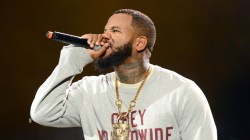
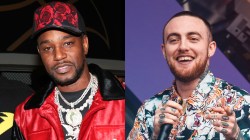
![Method Man Admits He Didn't Like Drake's "Wu-Tang Forever": "I [Wasn't] Getting On That"](https://hiphopdx.com/wp-content/uploads/2025/12/method-man-drake-wu-tang-forever-remix.jpg?w=250)
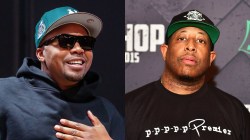
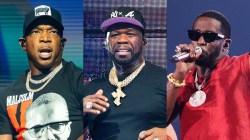
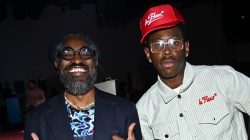

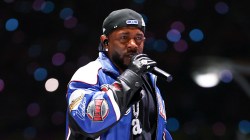
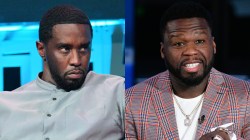
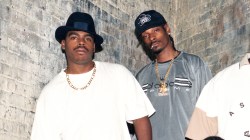
ANDRE GRANT IS SUCH A F.A.G FOR MAKRELMORE
Wah wah wah. White people stealing us, white people stealing our music, white people stealing our culture. Fucking crybabies. Nobody cares because all you people do is cry and complain. Everybody hates whining, even if y’all were green.
The only person crying and complaining is you for not listening to issues that affect people who aren’t like you.
I think he’s more of a spoken word rapper. The idea that he’s more of spoken word rapper makes more sense based on the content he’s put out. And with the song, “White Privilege II,” I think he’s giving us a perspective of what he goes through and his perspective being on the side of black lives matter. He’s saying that although he support Black Lives Matter, he still can’t fully relate to what Black Lives go through because he hasn’t had that experience. I think the song creates an interesting dialogue because we chastise white people all the time for having white privilege, but we never get to hear or understand the side that has the privileges but also supports our cause. How at times, the privilege adds more guilt when they don’t want the privileges.
ffs as if it matters what a ‘white’ rapper thinks, the problem is rich old white men running your country? How about stand up and sort this out first before criticizing an artist? lol you yanks really are half blind, and I thought us brits were dumb ass. Hey it doesn’t matter, Trump will be in charge soon…why? Because you let it….
It seems as if the writer here is looking for Macklemore to be the white MLK Jr. It is only a song and he is only a rapper. If you want more of these issues to be addressed and bring unity, more rappers need to come forward. Notice nobody says anything about 90% of other rappers who don’t say anything about the Black Lives Matters campaign? They get out of the hood yet could give a fuck about what happens in the community they grew up in.
The worst thing he could have done would be to tell white people to ‘stop being racist’ as the writer suggests. That would only serve to reduce this topic to right and wrong. What he does is try to show how complex the issue is. It is so complex that even he, despite marching, respecting the culture etc. can fully come to grips with it. ‘It is not just the white dude in Idaho. If more people can admit this, black and white, then we can make meaningful progress.